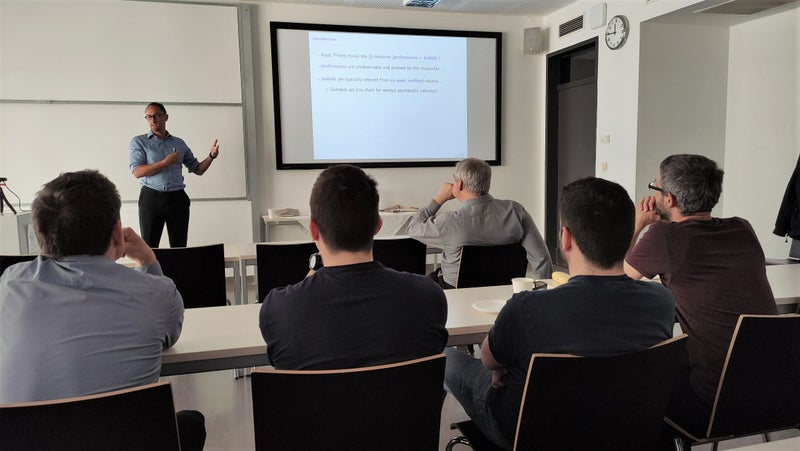Paul Whelan in Research Seminar: you can forecast the future better by understanding beliefs

Paul Whelan comes back to Budapest every year to work together with a Hungarian colleague on joint papers and participate in the Annual Financial Market Liquidity Conference that will take place again in November 2023 at Corvinus. “I love this city and I have experienced in the past couple of years that the Hungarians are very intellectual and welcoming people” – the professor told us during his visit at Corvinus University, on the 12th of June. The professor presented at the Research Seminar of the Institute of Finance, and also delivered a mini course on asset pricing to PhD students and professors as part of Corvinus Research Week.
His visit was mostly connected to his main field of research, empirical and theoretical asset pricing. Within this field, he is mainly focusing on macro-finance, belief formation, and market microstructure. However, he originally did not train as an economist. He earned his first degrees in physics at the University College London. After completing his master’s degree, he applied for a PhD program in physics. In the meantime, he got interested in economics, so he transferred to a PhD in financial economics at the Imperial College London. “At that time, I knew nothing about finance and economics. But I was welcomed at the doctoral school because I had the tools, like solving mathematical problems and coding”. The first couple of years meant an intense learning process for him because he had to gather the knowledge to understand what is behind the equations.
“My first job as an academic was in Copenhagen” – he told us. Last year, he celebrated 10 years of working at the Copenhagen Business School which is an international university. Paul is currently the supervisor of three PhD students, and he is teaching courses at MSc and PhD level on asset pricing, credit risk, and derivatives. The professor is moving to Hong Kong next September. “My research does not change, just my location”. This means that he will also continue working on his paper on subjective risk premia in bond and FX markets that he presented at the Institute of Finance at Corvinus.

The working paper is a natural follow-up of a previous work with Ilaria Piatti (Queen Mary University of London). A third author, Daniel Persch (Oxford, Saïd Business School) has also joined “this natural evolution of ideas”. The starting point of the paper is that the preferences and the beliefs of economic actors influence asset pricing. While preferences are typically unobservable, beliefs on the other hand can be measured. The paper explores a way of measuring beliefs by observing the properties of subjective risk premia, forecasting errors, and understanding subjective asset pricing.
“We have a dataset of people’s beliefs from an English company that includes professional forecasters from different parts of the world. They tell us what they think the interest rate, or the exchange rate will be in one year’s time” – the researcher explained. The researchers are working with a survey data set from 1995 to 2022 that includes the expectations of professional economists working at banks and other financial institutions in several countries. According to the lecture, this data is reliable because these economic actors aim to predict the future as precisely as possible.
These professionals provide forecasts of foreign exchange rates, interest rates, and other macroeconomic data based on their subjective beliefs. The advantages of the method include that surveys provide real-time, model-free, and forward-looking data. After a year passes, the suggestions can be compared to the actual rates. “In this way, we can measure the errors that the agents are making in the forecasting” – the researcher explained. When repeating this process over a longer time period and collecting people’s beliefs repeatedly, big data provides researchers with new opportunities.
“It turns out that you can forecast the future better when looking at what everybody is saying about it” – the professor explained. “My agenda is to push the narrative that we can gain more economic understanding by looking more closely at datasets”. The paper that he presented fits into this agenda. It is based on the concepts of standard asset pricing but twists them a bit to show that subjective risk premia can actually be measured.
Written by Tünde Taxner